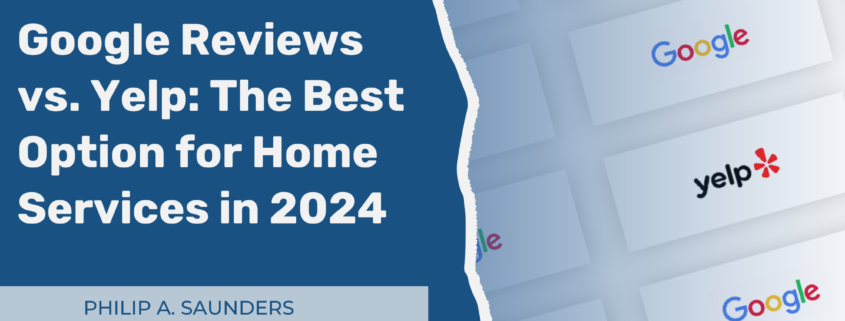Yelp vs. Google: Why Home Services Companies Are Betting on Google Reviews
Shares of Yelp (YELP) took a hit this morning, falling nearly 3% following a critical assessment by BofA Securities analyst Nitin Bansal. Bansal, who initiated coverage of the stock with an “Underperform” rating and a $30 price target, expects further downward revisions in Yelp’s earnings through 2025 and 2026. The primary reason? Declining ad revenue and weaker spending from Yelp’s traditional core of restaurants and retail businesses.
To mitigate this, Yelp is increasingly betting on home services businesses to bolster its bottom line. Yelp sees a promising growth opportunity in this sector, projecting that home services providers will boost their ad spending on the platform in the coming years. But based on years of conversations with home services business owners, I’ve found that many in the industry view Yelp with skepticism—and instead are doubling down on Google Reviews.
Many home services business owners are wary of Yelp, with numerous complaints about the platform’s high ad costs, aggressive sales tactics, and inconsistent review algorithms. As a result, more and more home services companies are choosing to focus their review efforts on Google.
The Rise of Google Reviews in the Home Services Industry
There are several reasons why home services businesses are making this shift, and they offer valuable lessons for anyone looking to grow their business in today’s digital landscape. Let’s dive into five key reasons why Google Reviews are a better option for home services providers than Yelp.
Google’s Dominant Market Share and Search Engine Visibility
One of the biggest advantages Google Reviews offers is its unparalleled visibility. Google is the world’s largest search engine, and consumers are more likely to start their search for a local business with a Google search rather than by going directly to Yelp. When a homeowner searches for “window replacement near me” or “HVAC repair,” Google’s search results feature a prominent display of local businesses, complete with their Google Reviews.
Yelp, on the other hand, functions as a separate platform. While it’s true that Yelp reviews can sometimes appear in Google search results, they don’t have the same native integration that Google Reviews do. For businesses, this means that having a strong presence on Google can significantly improve their chances of appearing in the all-important top search results, where most customers make their decision.
Trust and Credibility with Consumers
Consumers generally perceive Google Reviews as more trustworthy than Yelp reviews. Part of this stems from the fact that Google is seen as a neutral party, whereas Yelp has a reputation for being a business that benefits from the reviews it hosts. Yelp has been plagued by accusations from business owners who claim the platform manipulates reviews to encourage paid advertising.
In contrast, Google’s review system is considered to be more transparent. Businesses can’t pay to remove negative reviews or promote positive ones. This level playing field makes Google Reviews more credible in the eyes of consumers. In an industry like home services, where trust is paramount, the perceived authenticity of Google Reviews can be a major advantage.
Google Reviews Are Free to Manage and Respond To
For home services businesses, managing Google Reviews is free. Companies can claim their Google Business Profile listing, respond to customer reviews, and engage with their audience without paying a dime. Yelp, on the other hand, encourages businesses to invest in paid advertising if they want to manage their online reputation effectively.
This difference in cost structure makes Google Reviews much more appealing to small and medium-sized home services businesses, which often operate on tight margins. The ability to cultivate reviews and engage with customers without being locked into an expensive advertising contract gives Google a distinct edge.
Google Reviews Integrate with Other Google Tools
Google Reviews aren’t just valuable on their own—they also integrate seamlessly with other Google tools, like Google Maps and Google Ads. This creates a more cohesive experience for consumers. A homeowner looking for a service provider can see reviews directly on Google Maps, helping them make a decision in real time.
Additionally, businesses that run Google Ads can leverage their positive reviews as part of their ad campaigns. For example, businesses with high ratings can display their star rating in their Google Ads, offering social proof to potential customers. This integration is something Yelp simply can’t offer.
Long-Term SEO Benefits
Finally, one of the biggest reasons home services businesses should focus on Google Reviews is the long-term SEO benefits they provide. Google Reviews are a key factor in local SEO, helping businesses rank higher in search results. The more high-quality reviews a business has, the more likely it is to appear in the coveted “Local Pack” of search results—the top three businesses that appear in a Google search for local services.
Over time, a well-managed Google Business Profile with strong reviews can significantly improve a business’s visibility and attract new customers organically, without the need for paid ads. This makes Google Reviews an essential part of a long-term digital marketing strategy.
Similar Posts:
- The Truth Behind the Google Search Partners Ad Network: What Home Services Companies Need to Know About Click Fraud and Brand Safety
- Google’s LSA Update (February 2024): A Fast Track to Ad Spend Disaster?
- Why Your Home Services Business May Be Overpaying for Customers (And How to Fix It)
Mr. Saunders serves as Mesa’s Vice President of Marketing, bringing with him a wealth of experience in strategic marketing and operations. In this role, Mr. Saunders is responsible for overseeing all marketing activities, utilizing a blend of traditional and digital strategies to enhance brand presence and profitability, managing a multi-million dollar marketing budget across various media platforms, and leading the continued implementation of CRM systems to streamline customer engagement and drive business growth.




Leave a Reply
Want to join the discussion?Feel free to contribute!